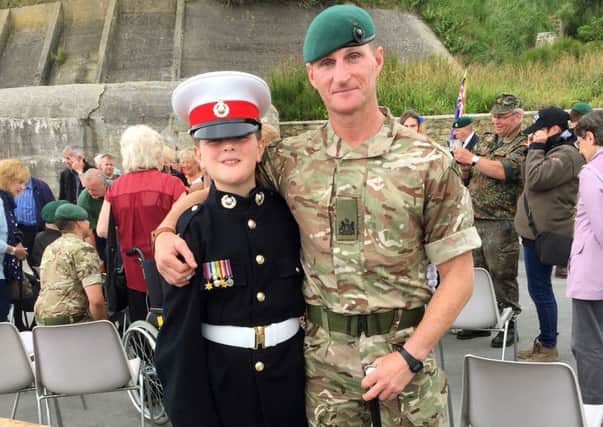VERITY LUSH: A sense of remembrance is crucial


And until remembering is taken from us, by either age, accident, or disease, we most likely take it for granted.
But it is within remembering, and the act of remembrance, that we keep loved ones alive. It is within the act of remembrance that we try to change the future based upon the lessons of the past – many of which we have seemed all too keen to readily forget in recent times.
Advertisement
Hide AdAdvertisement
Hide AdIt is also the passing on of memories, and rituals for remembrance, that allows each new generation to also keep something of the past alive, and it is for this reason that it is crucial that we as parents and families – and not only schools – make the effort to educate our youngsters.
Local lad, Jimmy Ring, has had the importance of remembrance instilled in him since he was tiny.
Jimmy is in the Royal Marine Volunteer Cadet Corps and was recently taken under the wing of WO1 Lee Drinkwater RSM from Devonport in Plymouth, in order to take part in four ceremonies around the town of Port en Bessin in Normandy.
One of these ceremonies was in honour of Captain Cousins of the 47 RS Commando. This brave hero of our not-so-distant-past led the attacks on the
German bunkers above Port en Bessin and died doing so.
Advertisement
Hide AdAdvertisement
Hide AdHe died, therefore, for future generations to have liberty. So it makes perfect sense that children such as Jimmy learn about, commemorate, and remember, Captain Cousins – only one of millions of brave young men.
Jimmy wore his great-grandfather, Billy Swift’s, medals, and also placed flowers in Luc Sur Mer at the memorial for the 23rd Destroyer Flotilla that Billy himself had been in.
The horror of war is now, thankfully, as unimaginable to most youngsters as the electronic devices they are so often glued to would have been to their great-grandparents.
But had it not been for those men and women of war, then our world would be a very different place.
Lest we forget.
THE LOST ART OF DAYDREAMING
Advertisement
Hide AdAdvertisement
Hide AdThere has been much in the press about devices and our continual use of them.
The average number of times that a person checks their phone in a day is 56 – even without hearing a notification of some kind.
When my family and I go away, we always switch our phones off.
It’s incredibly weird for the first day but then swiftly becomes a source of huge relaxation. No texts, no emails, no social media, nothing.
Advertisement
Hide AdAdvertisement
Hide AdAccording to studies, we are losing the ‘art’ of daydreaming.
Of simply having time when your mind wanders and you come up with your best ideas. We are losing our manners when glancing perpetually at our phones as opposed to making eye contact with our friends.
In short, we are losing our minds to devices.
WHEN GOOD MEN DO NOTHING
I’ve been watching the second season of the American teen drama 13 Reasons Why on Netflix and, whatever the strengths or weaknesses of the show, the concept of bystanders and enabling never fails to get me riled.
It takes huge guts to stand up to people – and that’s just when you stand up for yourself.
Advertisement
Hide AdAdvertisement
Hide AdTo also stand up for the oppressed takes even more, due to our human wish to not involve ourselves for fear of detrimental effects on our own lives.
But to stand by or, worse, to enable a bully, is despicable and something to be ashamed of.
And once you do manage to make a stand, or lend a hand, then others will do the same.
There’s a reason the #metoo movement has been so successful, and it’s because there is strength in numbers.